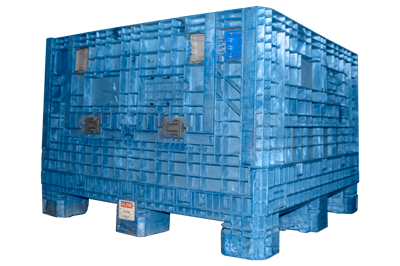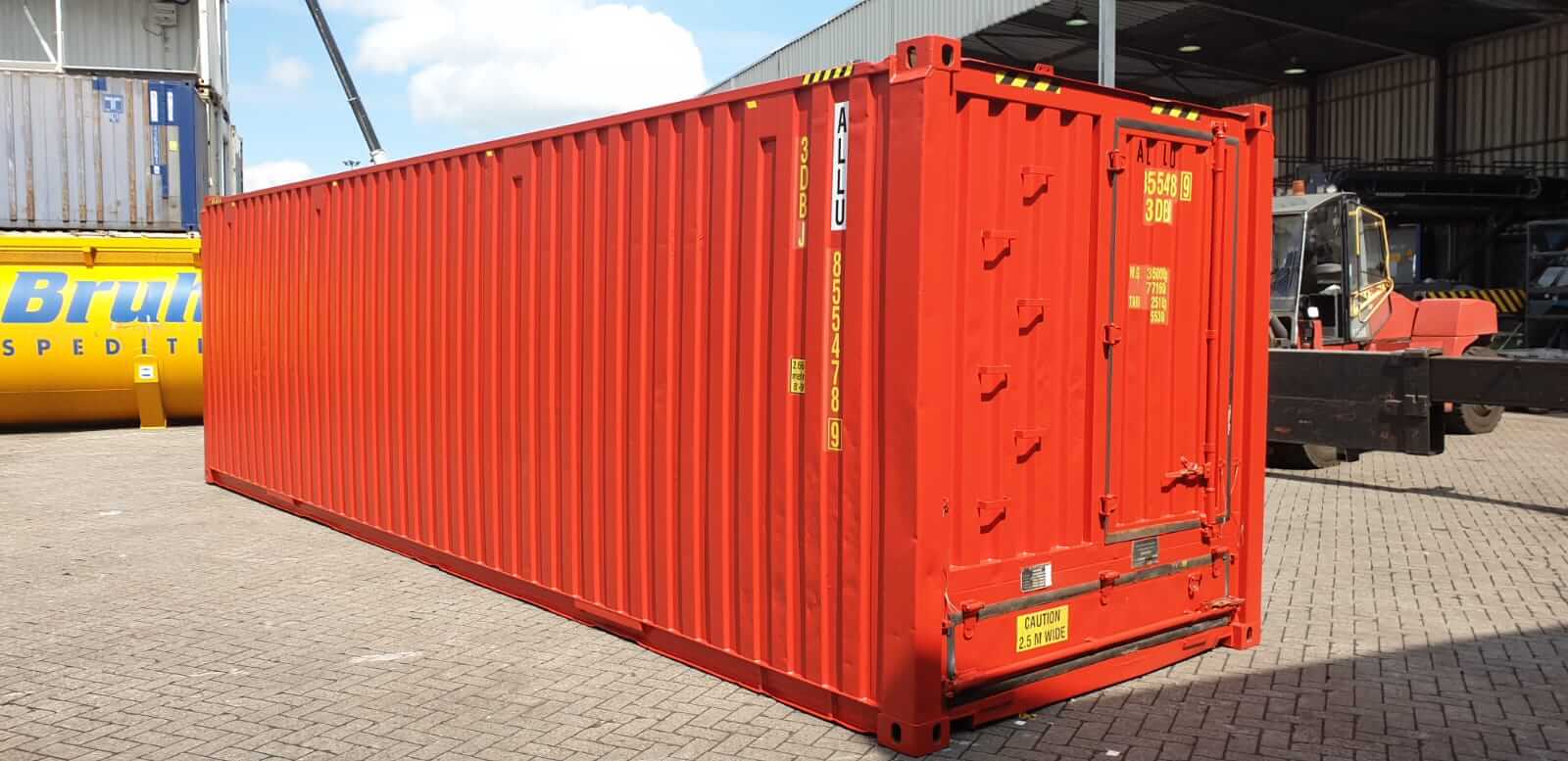The Ultimate Overview to Selecting the Right Mass Containers for Your Service Demands
Selecting the ideal mass containers is important for any kind of service that depends on effective logistics. Numerous sorts of containers exist, each developed for certain materials and applications. Elements such as dimension, material compatibility, and regulatory requirements play a considerable role in this decision-making process. Recognizing these elements can cause improved operational efficiency. Several organizations neglect essential elements that could enhance their total effectiveness and sustainability. What are these factors to consider?
Understanding Different Types of Mass Containers
Bulk containers function as important tools for organizations seeking effective storage space and transportation options. These containers come in various types, each developed to meet details functional needs. One typical kind is the intermediate mass container (IBC), which is perfect for liquid and granulated products, offering an equilibrium of ability and maneuverability. One more preferred alternative is the bulk bag, or FIBC, ideal for completely dry, flowable items. These adaptable containers are light-weight and can be conveniently carried and kept. For much heavier materials, inflexible mass containers are typically utilized, giving toughness and stability for secure handling. Additionally, there are specialized containers tailored for unsafe products, making sure conformity with safety and security guidelines. Understanding the distinctive characteristics of these bulk container kinds allows businesses to make enlightened decisions that maximize logistics and minimize expenses. By choosing the right container, companies can enhance their operational effectiveness and enhance their supply chain processes.
Secret Material Factors To Consider for Mass Containers
When selecting mass containers, it is important to contemplate the products used in their building. Elements such as durability, chemical, and stamina compatibility play an important function in ensuring the containers fulfill particular functional needs. In addition, weight and mobility issues can impact both performance and transport logistics.
Material Durability and Stamina
Durability and toughness are essential aspects in choosing materials for mass containers, as they directly influence the container's capacity to withstand different ecological problems and dealing with procedures. Materials such as high-density polyethylene (HDPE), polypropylene, and stainless-steel are frequently preferred for their robust buildings, providing resistance to abrasion, influence, and temperature level changes. The choice of material also influences the overall lifespan of the container; more powerful products generally lead to less frequent replacements, leading to cost savings gradually. In addition, the weight of the product can affect shipping costs and simplicity of handling. Companies need to consider their specific functional environments and the possibility for damage to guarantee peak toughness and stamina in their bulk container selection.
Chemical Compatibility Aspects
Comprehending chemical compatibility is crucial for picking bulk containers, as the products made use of must stand up to the details substances they will hold. Numerous aspects affect compatibility, consisting of the chemical nature of the materials, temperature level, and duration of storage space. Corrosive chemicals might need containers made from stainless steel or specialized plastics that withstand degradation. In addition, reactive substances can create warm or gases, demanding vented or pressure-rated containers. The choice of container product, whether polycarbonate, polyethylene, or metal, must align with the chemical homes of the stored materials to stop breaches or leaks. Inevitably, a thorough assessment of these compatibility factors ensures secure handling and storage space, safeguarding both employees and the setting while keeping item stability.
Weight and Portability Issues
Choosing mass containers involves not just assessing chemical compatibility yet additionally taking into consideration weight and mobility. Businesses need to examine the simplicity of handling and transportation to maximize efficiency. Light-weight materials like high-density polyethylene (HDPE) or light weight aluminum can promote simpler movement and minimize delivery prices. On the other hand, larger containers may offer improved toughness yet can prevent wheelchair, especially in settings calling for regular moving. In addition, the layout of the container should permit hassle-free training and stacking, making sure ergonomic safety for workers. Firms should also think about the framework readily available for transport; for instance, containers compatible with forklifts or pallet jacks can simplify operations. Inevitably, the appropriate equilibrium in between weight and transportability directly influences operational effectiveness and cost efficiency.
Sizing Your Bulk Containers for Optimum Efficiency
When sizing mass containers, businesses have to meticulously assess the measurements required to suit their particular items. Additionally, weight capability is a vital variable that affects effectiveness and safety throughout transportation and storage. Effective sizing not just takes full advantage of area but likewise optimizes functional operations.
Determining Container Dimensions
Picking the ideal dimensions for mass containers is vital for optimizing effectiveness in storage and transport. Services should assess their certain needs, taking into account variables such as offered room, the nature of the items being kept, and the methods of transport made use of. Precise dimensions guarantee that containers fit ideally in storage facilities and vehicles, minimizing wasted room and decreasing handling time. Requirement dimensions can provide convenience, but customized dimensions may be needed for distinct demands or to suit specific products. Furthermore, it is necessary to review stacking capabilities and ease of access, as these factors influence total functional performance. Ultimately, the right dimensions bring about improved organization and streamlined logistics, benefiting the overall efficiency of the business.
Weight Ability Considerations
Recognizing weight ability is crucial for businesses aiming to enhance their mass container effectiveness. The weight ability of a container directly affects storage space abilities, transportation logistics, and general functional prices. Selecting containers with the proper weight limitations assures that organizations can securely save and carry their items without taking the chance of damages or conformity issues. Overloading containers can lead to structural failures, while underutilizing ability outcomes in thrown away resources. It is necessary for services to evaluate their product weights and consider any governing needs when picking containers. In addition, elements such as the type of material, planned use, and environmental conditions should additionally influence weight capability choices. By assessing these aspects, services can enhance performance and ensure a structured supply chain.
Regulatory Conformity and Security Requirements

Regulative compliance and security criteria play a vital duty in the choice of mass containers for businesses. Organizations should assure that their containers fulfill numerous regulations set by local, national, and worldwide authorities. used collapsible containers These requirements usually relate to product safety, architectural honesty, and proper labeling, which aid stop crashes and guarantee the secure transportation of products.
Additionally, adherence to industry-specific guidelines, such as those from the Food and Drug Management (FDA) or the Occupational Safety And Security and Wellness Administration (OSHA), is important for business handling dangerous materials or foodstuff. Non-compliance can result in fines, legal issues, or damage to a service's reputation.
Services must likewise consider the container's compatibility with the products being saved or carried to avoid contamination or chain reaction (used collapsible containers). To sum up, recognizing and carrying out regulatory conformity and safety and security criteria is vital for the responsible and reliable usage of bulk containers
Sustainability Options for Eco-Friendly Mass Containers

Companies are additionally discovering alternatives made from recycled products, which not just save resources but likewise sustain the recycling industry. Technologies in style allow for lighter containers that call for less energy to transportation, even more enhancing sustainability. By incorporating these green mass container options, companies can demonstrate their commitment to ecological stewardship while satisfying consumer need for sustainable techniques. This change not just helps the planet but can likewise improve brand reputation and customer commitment.
Cost-Effectiveness and Budgeting for Mass Containers
While several organizations focus on sustainability, cost-effectiveness continues to be a critical factor when selecting mass containers. Organizations must evaluate the preliminary acquisition price, along with long-lasting operational costs, to guarantee financial feasibility. Elements such as reusability, upkeep, and resilience play a considerable duty in figuring out general expenditures.
Purchasing premium containers might produce greater in advance costs yet can result in financial savings via reduced substitute prices and reduced waste. Furthermore, organizations need to think about transportation expenses and storage efficiency, as these can impact the total budget plan.

Often Asked Questions
How Do I Figure Out the Right Container for Hazardous Materials?
To identify the ideal container for hazardous materials, one should assess compatibility with the compound, think about the container's product, check for regulatory compliance, and evaluate capacity and security functions to ensure proper handling and storage.
Can Mass Containers Be Customized for Specific Products?
Yes, bulk containers can be personalized for details items. refurbished bulk containers. Numerous functions, such as product, dimension, and design, can be tailored to fulfill one-of-a-kind requirements, making certain suitable security and efficiency for transporting and storing various goods
What Is the Average Life Expectancy of Various Bulk Container Kind?
The typical lifespan of mass container types differs; plastic containers last 5-10 years, metal containers 10-20 years, and wood containers typically last 3-7 years, depending upon usage, upkeep, and ecological conditions.
Exactly how Should I Clean and Maintain Bulk Containers?
To cleanse and preserve bulk containers, one ought to routinely check for damages, eliminate residue, clean with proper detergents, wash completely, and guarantee proper drying before storage. Adhering to producer standards enhances long life and security during usage.
Are There Rental Options for Bulk Containers Available?
Yes, countless companies use rental options for bulk containers, supplying adaptability for services. These rentals can accommodate various needs, enabling firms to handle supply efficiently without the dedication of purchasing containers outright.
Durability and stamina are vital aspects in choosing products for bulk containers, as they straight affect the container's ability to endure various ecological conditions and managing procedures. Comprehending chemical compatibility is important for choosing bulk containers, as the materials made use of must resist the particular substances they will certainly hold. Understanding weight capability is crucial for organizations intending to maximize their bulk container efficiency. Regulative compliance and security requirements play an essential role in the choice of mass containers for businesses. While many businesses focus on sustainability, cost-effectiveness remains an important variable when picking bulk containers.